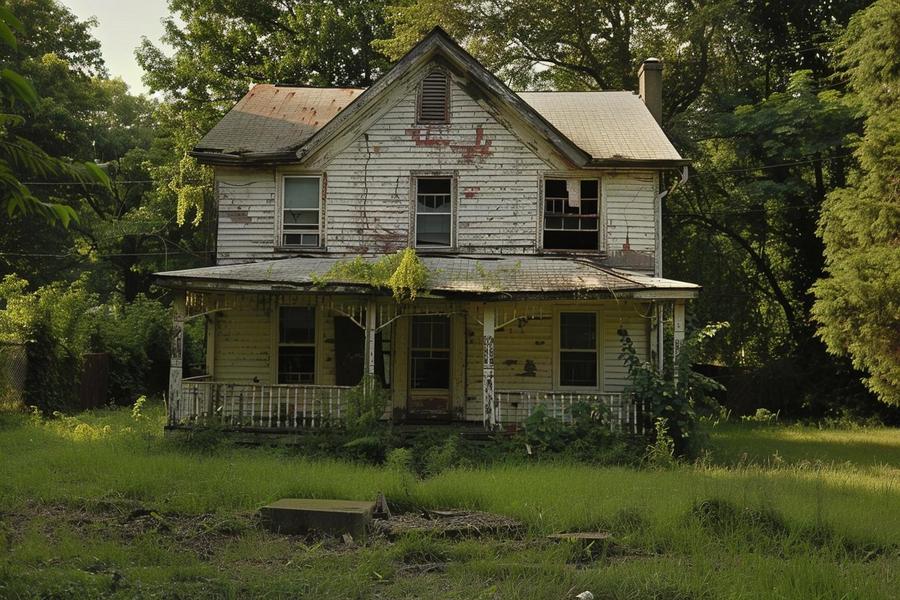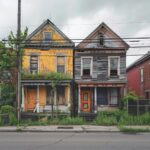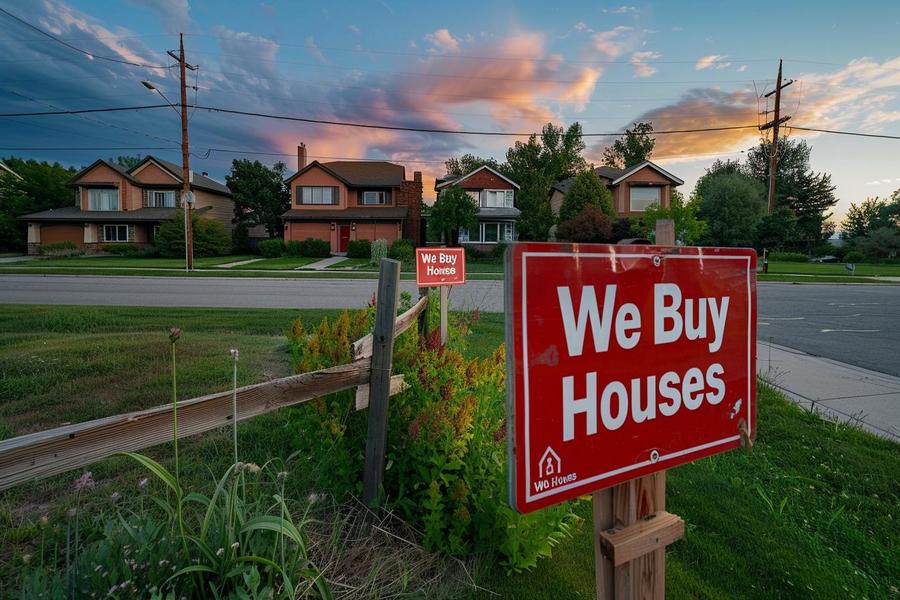Think your condemned house is a lost cause? Think again. You can sell it. Yes, even houses slapped with a big, scary "condemned" notice have buyers waiting. This guide dives into the nitty-gritty of ditching the doom and gloom of condemnation. From legal hoops to cash in your pocket, we cover it all. Selling a condemned property might seem like climbing a mountain, but with the right info, it's more like a stroll in the park. Let's get started.
TL;DR
- You can sell a condemned house, mostly to investors or flippers who seek profit by renovating them.
- Condemnation drops a house's value due to safety or health risks, but selling "as-is" offers a quick way out for owners.
- Repairing a condemned property requires addressing serious issues like structural damage, which can be costly.
- Owners still have rights after condemnation and can either sell, fix, or challenge the condemnation process.
- Eminent domain can force the sale of condemned properties for public use, with owners potentially challenging compensation.
- Buying a condemned property involves assessing risks and costs, with potential profit from flipping or renting after renovations.
What Happens When a House is Condemned?
Understanding the Legal Process of Condemnation
When the government says a house is not fit to live in, it's condemned. This can happen because of big damage or safety risks. Places like Miami, Detroit, or old parts of San Francisco may see this more due to old, unsafe houses.
Consequences for Property Owners
If you own a condemned house, you face big issues. You can't live there or let others live there until it's fixed and passes inspection. This often means spending a lot of money on repairs.
The Role of Code Enforcement in Condemnation
Code enforcement officers check homes to make sure they are safe. If they find problems, they might condemn the house. They look for things like weak floors, bad wires, and broken roofs. If they say a house is condemned, they stick a notice on it. This notice tells everyone that no one can live there.
In summary, a condemned house means big trouble. It costs a lot to fix it. But it's important to make homes safe for everyone. If you want to learn more about these laws, check out condemnation law.
Can You Legally Sell a Condemned House?
Navigating the Market for Selling Condemned Properties
Yes, you can sell a condemned house. Most buyers are skilled in fixing big problems. They know how much it costs to repair extreme damage. Selling for cash is a common way. This is because regular loan companies often won't help.
Assessing the Challenges in Selling As-Is
Selling a condemned house "as-is" means the buyer gets it with all its problems. You don't have to fix anything. But, be clear about the house's issues. Hidden problems can cause a deal to fail. Always list all known issues with the property.
Most professionals understand these sales well. They still expect full honesty about the property's state. Buyers need to check for unpaid taxes and legal claims. Part of the sale might need to handle these. Make sure you know your local rules too. Some places might require special steps or notices for selling these homes.
A house gets condemned for many reasons. It could be unsafe to live in due to damage or neglect. Sometimes, a big city project needs the land. In these cases, the government might take over the property.
Remember, a house that's just empty or abandoned differs from one that's condemned. An empty house does not automatically mean it's unfit. But it can turn into a condemned property if left alone too long.
Related Links:
–Selling a House in Poor Condition: A Guide
–Selling a House that Needs Repairs: A Guide
Who Buys Condemned Houses?
Can you sell a condemned house? Yes, you can. Pros in the real estate world often buy these houses. They see great potential in fixing them up. These buyers typically include investors, flippers, and developers familiar with such properties.
Profiles of Potential Buyers
Most buyers of condemned homes aim to flip them for profit. These may be individual investors or real estate companies. They look at the list of condemned houses and see a chance to turn a decline into a gain.
The Appeal of Condemned Properties to Investors
To many investors, these properties are diamonds in the rough. They purchase condemned property because the costs are often lower. The low buy-in cost is a big draw. Yet, they realize the fix-up effort needed. They know the ropes and the fix costs. They also understand the local market well. This insight helps them make a wise investment. You can find more details on buying and selling these homes here.
Thus, while regular buyers might avoid a condemned home, seasoned investors approach them as opportunities. They are ready to handle the legal and repair challenges. The key is in seeing past the present state to the property’s future worth. Flippers renew these homes, which can help the neighborhood too.
How to Address Violations on a Condemned Property?
Taking the First Steps Towards Compliance
When you get a condemned house, fix the big problems first. These big problems are why the house got condemned. Think about stuff like weak floors, broken walls, and roofs with holes. You must fix these to make the place safe again.
Next, check for health risks like black mold or pests. Get rid of these dangers right away. They can make people very sick. It's important to do this before you welcome anyone inside.
Then you need to review local code rules. Each place has its own rules about houses and buildings. Make sure you know what your city or county needs. For example, rules in Miami might be different from those in Houston.
Working With Professionals to Address Violations
Handling a condemned property takes a lot of work. It’s smart to hire experts like builders, electricians, and plumbers. They know how to get your place back in good shape.
Start by getting a good inspector. This person can take a deep look at the house. They tell you everything that's wrong. Then, get a skilled contractor. This person helps you plan and make the big fixes. Having the right team makes everything easier and safer.
Remember, the goal is to make the house safe and follow the rules. This way, you fix the problems that got the house condemned in the first place.
What Are the Repair Options for Condemned Houses?
Evaluating the Cost of Repairs
When you get a house fixed that the city has condemned, it will cost you. First, see what repairs you must do. Look at the notice from the city or ask them. It lists what's wrong with the house. See if these issues are things like a bad roof, broken windows, or deeper issues like a weak structure. Repair costs go up if the house's problems are big, like mold or a shaking foundation.
DIY vs. Hiring Professionals for Repairs
You might think about fixing the house yourself to save money. For small fixes, like a door that doesn't shut well or a few broken tiles, that could work. If you know how to do these repairs, go for it. But for big issues, like fixing a roof or sorting out a mold problem, you better call the pros. Pros know how to handle big repairs that meet city codes and won't mess up the house more.
When you think about fixing a condemned house, remember the costs can be very high. If the house needs a lot of work, sometimes it's not worth the money to fix it. You might end up paying more to repair the house than it's actually worth. This is important info anyone buying such a house needs to know. So, weigh the repair costs against the house's likely value after fixing. This helps decide if a condemned house is worth buying and repairing.
Are There Benefits to Selling a Condemned House As-Is?
Understanding the As-Is Selling Process
Yes, you can sell a house even if it's condemned. You must tell buyers about the house's problems, though. This kind of sale means you sell the home as it is right now. You don't fix anything before you sell it. Many buyers of such houses know they need to do a lot of work. They often plan to fix the homes to sell them again. Selling as-is could be faster than trying to fix everything first.
Potential Benefits to Sellers
Selling a condemned house as-is has some good points. First, you might sell it fast, getting that problem off your back. You also don't spend money on big repairs. This is great if you can't afford to fix it. Sometimes, you can still make money from the sale. Experts in fixing homes often look for such deals. They know how to fix the problems better than you might. This way, both you and the buyer can benefit. You sell a tough property, and they get a project that might pay off later.
How Does Condemnation Affect Property Value?
The Immediate Impact of Condemnation on Value
When a house gets condemned, its value drops fast. This means if you own such a house, its worth less now. But why does this happen? It's because no one can live there anymore. It may be unsafe or broken down. Think of places hit by bad floods or fires. Or old houses nobody has cared for in years. Such damages make living there risky.
In cities like Detroit or Cleveland, many homes face this problem. They stand empty and hurt neighborhood looks. Being near such houses can drop the value of your house too. No one wants to live next to a risky spot. People worry about their kids playing around such areas.
Long-Term Implications for Property Owners
Now, owning a condemned house is tough. Not just because its value is low, but fixing it costs a lot. Sometimes, it costs more to repair than the house's worth. Selling these is hard. You usually deal with special buyers. These buyers know how to fix such places or they tear them down to build new ones.
If you wait too long, things get even harder. The house might fall apart more. Or the city might step in and say it’s too late to fix. They might even tear it down and send you the bill. So, you should act fast if you find yourself in this spot.
In neighborhoods with many condemned houses, everyone's value might stay low. It takes big changes or many people fixing houses to lift the area's value. If you find a buyer, you might need to sell for a low price. Yet, it ends your worries about the house. It's tough but sometimes it's the best step to move on.
What are the Rights of Condemned Property Owners?
Navigating Owner Rights Post-Condemnation
Yes, you still have rights even if your house is condemned. You can sell it or fix it. The government or city usually steps in only when a house poses danger. This means your house might get taken over by them if not cared for properly. But they have to follow rules and so do you.
First, they must tell you why your house got condemned. Reasons might be things like safety problems or not living in the house for very long. They have to give you a chance to fix these issues. This could mean getting rid of mold or making the building strong again.
Legal Avenues and Resources for Owners
You have a right to talk to a lawyer or other experts. If you don't agree with the condemnation, these people can help you argue your case. Always double-check the exact rules for your city or county. Places like Houston or Miami might have different rules from smaller towns.
Sometimes, you can even get help from local groups that want to see houses fixed instead of torn down. They might help you find ways to make your house safe and livable again.
Exploring the Role of Eminent Domain in Condemnation
Understanding Eminent Domain
Eminent domain lets the government buy private lands for public use. This power can make a private land public for roads, schools, or utilities. They might declare private property "condemned" to do this.
The Process and Its Outcomes for Property Owners
When the government uses eminent domain, they must pay the owners. Still, owners may find the price too low or unfair. They can challenge this in court, seeking a better offer. If the court rules for the owners, they might get more money. If not, they must sell at the offered price.
This legal force affects not just individual homes but whole neighborhoods. It reshapes areas, sometimes improving them with new public structures. However, it might also force folks to leave homes they have lived in for years.
If you're facing a condemnation case due to eminent domain, you should know your rights and possibly seek legal advice. Knowing about eminent domain laws can prepare you for what's to come and help you tackle it better. Remember, each situation can vary widely depending on local laws and the specifics of the project involved.
What to Know Before Buying a Condemned House?
Assessing Risks and Opportunities
Buying a condemned house isn't simple. It takes knowledge and planning. If you plan to try, first, you must look at both good and bad sides. One good point can be the low price. Often, these homes cost less. But they need lots of work to fix.
Due Diligence and Pre-Purchase Considerations
It helps to learn about the house's past. Why did it get condemned? Was it due to poor design or damage from a storm? Answering these questions can guide how much you spend on repairs. Also, check if there are any old taxes yet to pay. This could add to your costs. You must visit the place too. See the problems firsthand. Talk to experts who know about fixing homes. Learn from those who flip houses. They see these deals a lot. They know the hidden troubles and what it needs to sell such homes again.
Houses can be condemned for many reasons. It might be because of safety worries or old age. Sometimes, a house is empty for too long. Or, the place might be in the way of a new road or building project. The law could step in then. Owning such a house can be tricky. A simple home fix might not be enough. Always try to get all facts and learn as much as you can. This will save trouble later.
Do Condemned Houses Have Any Redeemable Value?
Potential for Profit: Flipping and Renovation
Yes, condemned houses can have value. They can sell for less than other homes. This lets buyers who are ready to fix big problems buy them at a good price. People buy these homes, fix them, and sell them to make a profit. This is called flipping. Flipping a condemned house needs a lot of work. You must know about construction and the house's problems.
Before you think about buying a condemned house to flip, learn about the issues it has. Some common problems are weak walls, bad roofs, and broken pipes. These issues can cost a lot to fix. Also, the house might have pests like rats or harmful mold. You need to clean these up safely.
If you fix a condemned house right, it can turn into a lovely home. Then you can sell it for more money than you paid. But remember, flipping is not easy. You need skills, time, and money. To start, find out about local laws and get the right permits. If you skip this step, you might have to pay fines.
Look for condemned houses in areas where people want to live. This can make it easier to sell the house after you fix it. Also, talk to experts like appraisers or real estate agents. They know about prices and can help you make good choices.
Flipping is not the only way to use condemned houses. Some people fix them to rent out. Others fix them to live in themselves. All these options help the community. They make it nicer and safer to live there. They also bring up the value of nearby homes.
In short, condemned houses can be a good chance if you know what you are doing. Take your time to learn and plan. Then you can make a good decision. Happy flipping or renovating!
In this post, we dove into the world of condemned houses. We explored the legal side, selling challenges, and repair options. We also looked at who buys these properties and why. For those facing condemnation, understanding your rights and the process is key. Selling as-is might be a smart move, despite the impact on property value. For buyers, it's about seeing potential and knowing the risks. Remember, even condemned houses can turn into valuable assets with the right approach.















